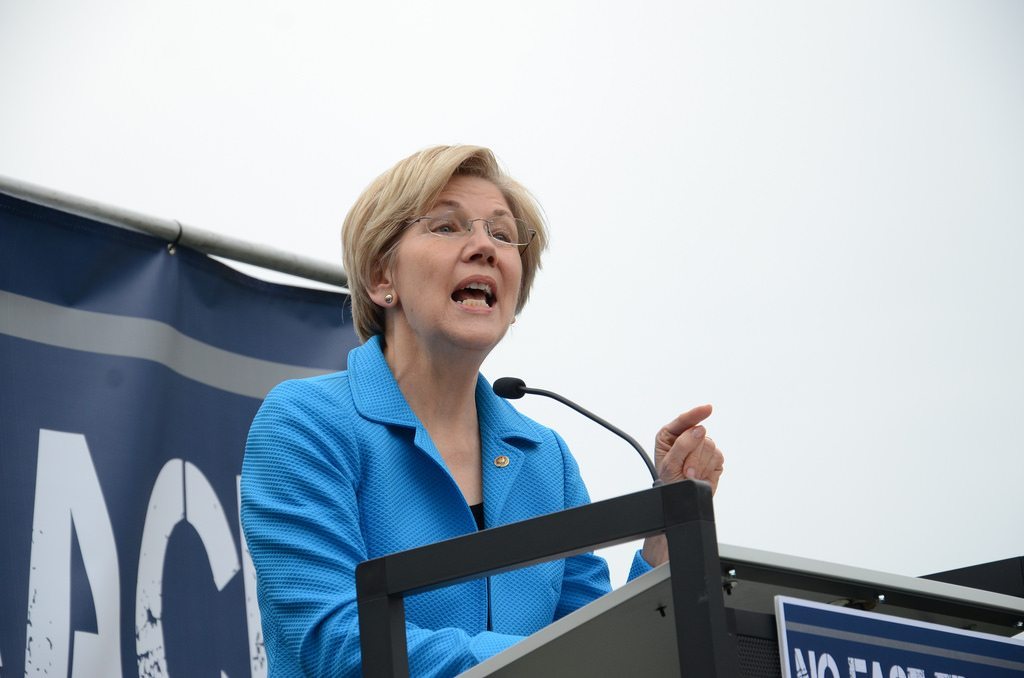Sen. Elizabeth Warren recently made a promise about her campaign and issued a challenge to the rest of the field.
“I’m not taking a dime of PAC money in this campaign. I’m not taking a single check from a federal lobbyist. I’m not taking applications from billionaires who want to run a Super PAC on my behalf. And I challenge every other candidate who asks for your vote in this primary to say exactly the same thing,” Warren said during her rally last Saturday in Massachusetts.
The other candidates, however, have already made similar pledges.
All of the Democrats who have launched a 2020 campaign or are formally considering a run have sworn off accepting corporate PAC money, campaign contributions that are pooled by corporate fundraising committees.
Some of the 2020 contenders are taking the pledge a step further by promising to reject donations from registered lobbyists and other PACs, while discouraging support from some types of so-called Super PACs that can raise and spend unlimited sums.
These days, voters seem to want to hear these kinds of pledges from candidates, perhaps because they think it diminishes the role of big money in politics. Unfortunately, that is not really the case.
In order to understand why rejecting corporate PAC money isn’t that consequential, it is important to know that corporations cannot donate directly to a campaign. In addition, campaign finance laws limit the amount PACs can donate directly to a candidate to $5,000 during a primary and another $5,000 in a general election (individuals—including registered lobbyists—are limited to $2,700 each part of the cycle). Because presidential candidates are required to raise hundreds of millions of dollars to compete, $5,000—$10,000 is a drop in the bucket and doesn’t buy much influence.
If you’ll notice, Sen. Warren pledged to reject all PAC money, while the rest of the candidates have said that they won’t accept corporate PAC money. Here’s why:
There are today about 4,000 PACs giving actively in federal elections. Most are sponsored by corporations, trade associations and other business and professional groups like the American Medical Association. The money comes not from the sponsoring organization, but from its employees or members…
They’re also the primary means that labor unions use to raise money for their political allies, which is why Democrats rely more heavily on PAC money than Republicans. (Historically, more than 90% of labor PAC contributions have gone to Democrats.)
In other words, any Democrat who swears off all PAC money also forgoes the most critical way that labor unions (as well as other issue-related PACs) provide their financial support.
I’m not sure what Warren meant when she said that she wasn’t taking applications from billionaires who want to run a super PAC on her behalf, but it’s also important to know what campaign finance law says about them. There are no limits on how much an individual can contribute to a super PAC, but they can’t donate directly to a campaign and are barred from coordinating with them. I suspect that Warren’s comment was meant to be lighthearted, but what she suggested she wouldn’t do is already illegal under current campaign finance laws.
The truth is that candidates can discourage super PACs from engaging in activities to support their campaigns (i.e. running TV ads), but they don’t have any leverage to stop them from doing so. You might remember the hilarious “C’mon, Ted” ads that ran during the O’Rourke-Cruz senate race in Texas. Those were paid for by the Fire Ted Cruz super PAC. O’Rourke had nothing to do with them and couldn’t have stopped them, even if he’d wanted to.
The largest Democratic super PAC is Priorities USA, which spent more than $190 million in support of Hillary Clinton in 2016. But Priorities is sitting out the 2020 primary, so there is no reason for any of the candidates to disavow them right now.
I understand the message Democratic candidates are trying to send with these pledges. But it is important for all of us to be aware of how and where the really big money comes into play in politics. That happens with the super PACs, which were unleashed by the Citizens United Supreme Court decision.



